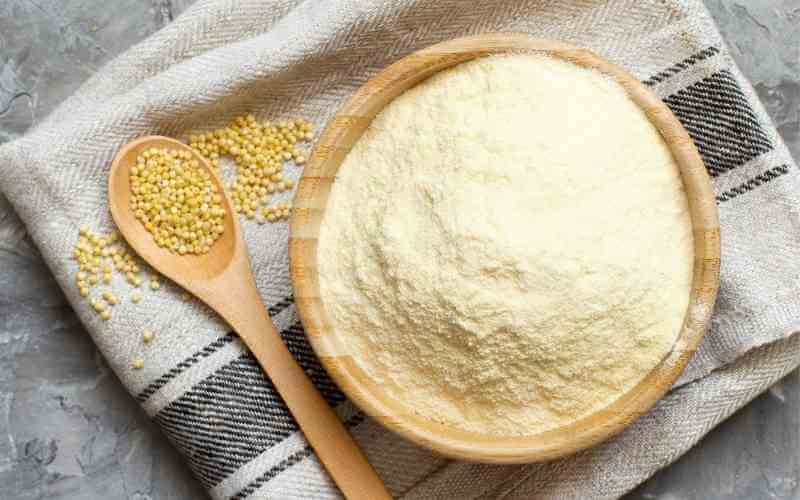Millet is a chock-filled nutritious grain that is popularly grown in Asian country-Indian and Africa.
And although this wonderful cereal crop is virtually neglected, it is a staple food for every kitchen, whether you are on a gluten-free diet or not.
Millet is a whole grain that can substitute for rice. The mild flavor and adaptable texture allow for other ingredients to widen and increase their flavor.
Millet is not just the best substitute for other grains; you can grind it and use the flour to bake some food. If you are here, chances are it’s time to bake some crispy cookies and savory muffins. Do you need a substitute for millet flour to bake your recipe?
Well, rice flour, sorghum flour, cassava flour, quinoa flour, and buckwheat flour are excellent substitutes for millet flour.
Now, let’s learn about these flours and how their taste differs!
Contents
Why are these flours an excellent substitute for millet flour?
These flours are gluten-free flours and would, without altering the flavor of your recipe, fit in to serve its purpose just as millet flour would.
Not only are these flours gluten-free, but they also have a mild and virtually nutty flavor that would enhance the flavor of your recipe.
Above all, they are highly nutritious, just like millet flour, and would offer nutritional values when you use them to bake your muffins, bread, cookies, and even cakes.
Read on to find out more about these flours as we discuss them.
Read: Potato Side Dishes For Jerk Chicken (7 Tasty Side Dishes)
Substitutes for millet flour
- Rice flour
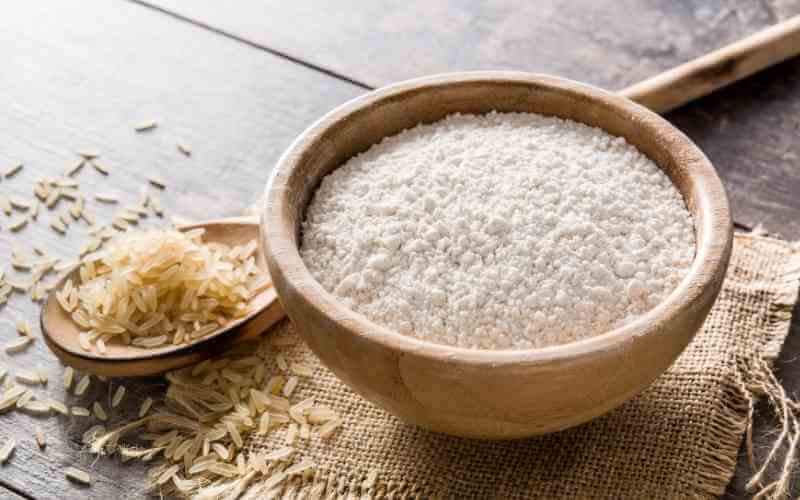
Rice flour is ground from rice grain. Rice is quite popular and people use it for a lot of recipes, whether brown rice or white rice. And originally rice in its natural form whether brown or rice are gluten-free. That’s why it is an excellent substitute for millet.
What about the taste? Well, rice has a mild flavor and a chewy texture. And for brown rice, they have a slightly nutty taste and white rice has a little flowery taste which paints it the best fit for millet substitute.
A lot of cooking experts consider this go-to gluten-free flour if you cannot get millet flour to do your bidding. And the fun part is that rice flour would not overshadow other ingredients, thanks to the mild and adaptable flavor.
You can bake bread, muffins, cake, and even homemade biscuits with rice flour. So you can go ahead and bake some yummy food with your rice flour.
2. Sorghum flour
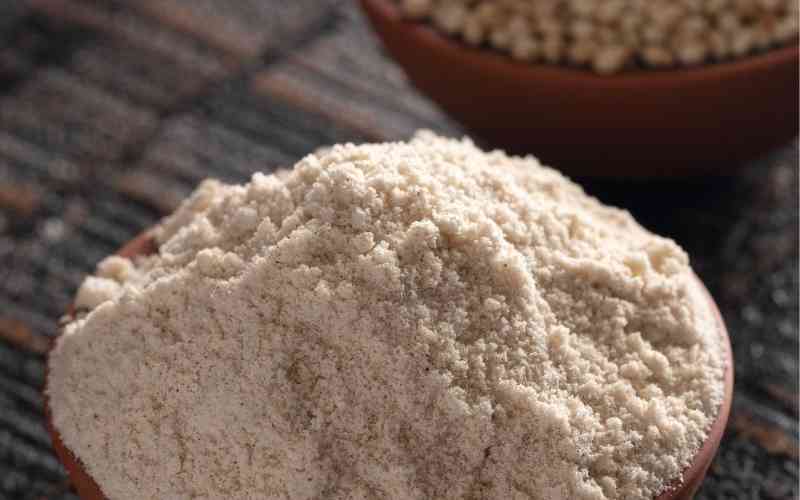
If you’ve run out of millet flour and you scrolled past sorghum flour since millet flour is not available, this might be the right time to scroll back.
Sorghum (Sorghum bicolor) is also called the great millet. Both millet and sorghum are from the grass family and are grains. However, millet is a grain from the panicum miliaceum plant, while sorghum is a grain from sorghum bicolor.
They both share some similarities. Both sorghum and millet a cereal crops that have many nutritional values. And naturally, sorghum is gluten-free, just like millet. More so, these crops are drought-tolerant and so would thrive in arid areas.
So, sorghum flour is ground from sorghum and is a great substitute for millet. So if you are skeptical about finding the best replacement. We recommend sorghum flour.
What about the taste? Sorghum flour has a nutty flavor that is virtually the same as wheat berries. Since millet has this unique sweet yet mild taste, consider sorghum the best replacement.
You can bake sweet bread, crispy cookies, and fluffy cakes with sorghum flour.
3. Quinoa flour
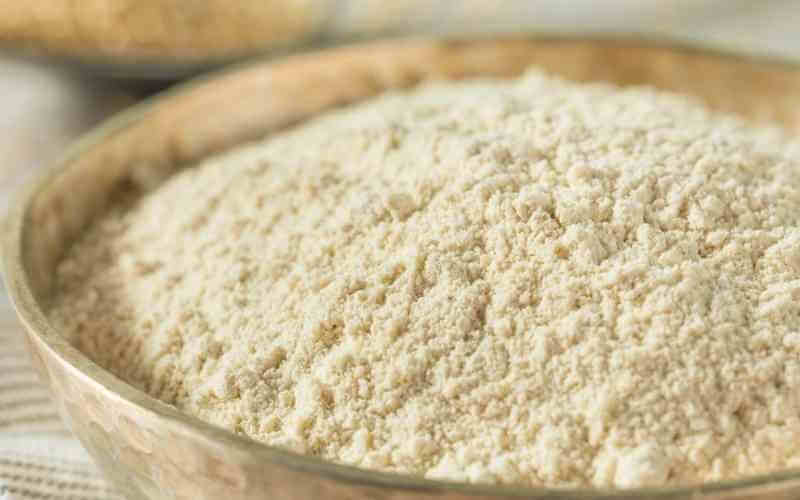
Quinoa is another grain that is a great substitute for millet, whether you want a replacement for a whole seed or just flour for your food.
This grain is a flowering plant and, although it is from the amaranth family, it is originally grown for edible seeds. And quinoa flour is from quinoa. Is quinoa a substitute for millet flour? Yes, it is. Quinoa flour is a great substitute for millet flour.
What about the taste of quinoa? Quinoa has a mild taste and would give way for other ingredients to saturate and grant the food taste worthy.
If you wish for gluten-free bread for your household then we recommend quinoa flour as a healthier substitute for millet flour. You’re welcome!
4. Buckwheat flour
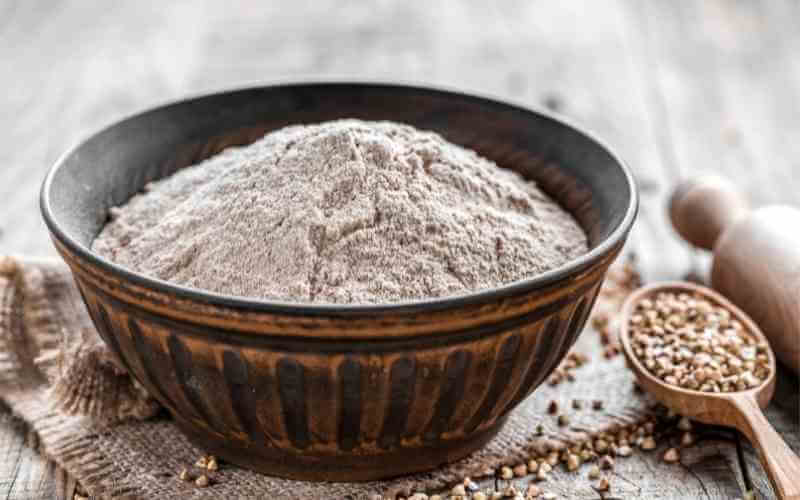
Also known as beech wheat or kasha, buckwheat is a nutritious grain that has high levels of fiber. This grain is a healthy substitute if you are looking forward to expanding your culinary skills without rice.
It is a superb source of protein and is naturally gluten-free, which makes it a suitable substitute for millet. The health benefit of buckwheat is second to none. So you can have a mouth-watery launch with buckwheat.
And if you want to bake, grind the seeds into fine flour and bake some food with it.
What about the taste? Okay, buckwheat has a combination of bitter, nutty, and earthy flavors.
You can bake some gluten-free buckwheat cookies, you can bake some banana bread, muffin crackers, and even cakes with buckwheat. Whoops! Quite a lot, right?
Well, get on with it; go get your household some gluten-free recipes!
5. Cassava flour
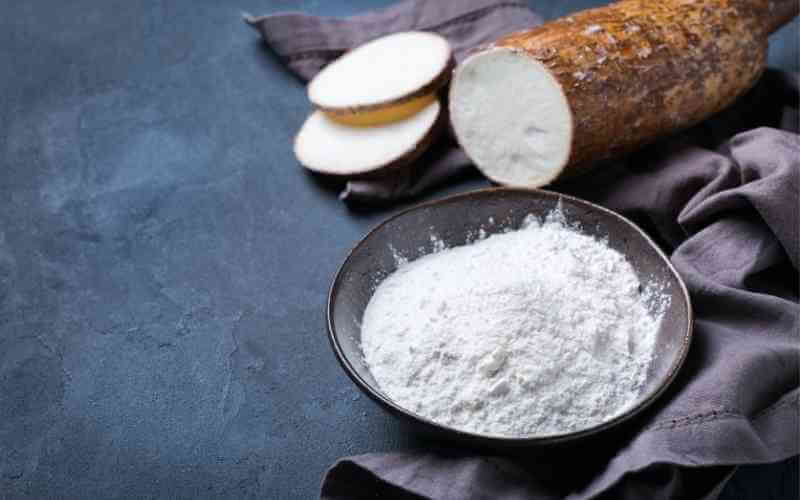
You can make some rich moist cakes with cassava flour. You can serve your household some jaw-dropping gluten-free pizza dough to complete the day. Really, and that by just adding cassava flour to your gluten-free recipe.
Cassava flour is ground from cassava. Cassava itself has a sweet taste, almost similar to rice. It is known for its subtle flavor, slightly sweet, nutty flavor, and some traces of bitter taste. So, if the millet is not at your beck and call, then you can settle for cassava flour.
Do you know banana flour is another substitute for millet? Well, banana flour is a good choice if you want to bake some quick food.
And unless you do not want any banana flavor in your recipe, ignore this. However, if you consider the banana flavor a must flavor in your recipe, then consider some banana flour. Meanwhile, the flavor is mild because of the use of green bananas.
Read: How Long Will Food Stay Warm After Crockpot Is Unplugged?
Conclusion
Congratulations, you now have a good number of substitutes for millet flour. So you do not have to put your baking on hold just because millet flour is not available.
There are other great substitutes for millet flour, and can only be useful if you are not on a gluten-free diet. Refer to this guide to know the taste that best fits into your recipe.
The best part of it is that most of these are great substitutes for millet if you do not have millet for you and your household some whole grain meal for launch
Good luck as you explore these flours!
